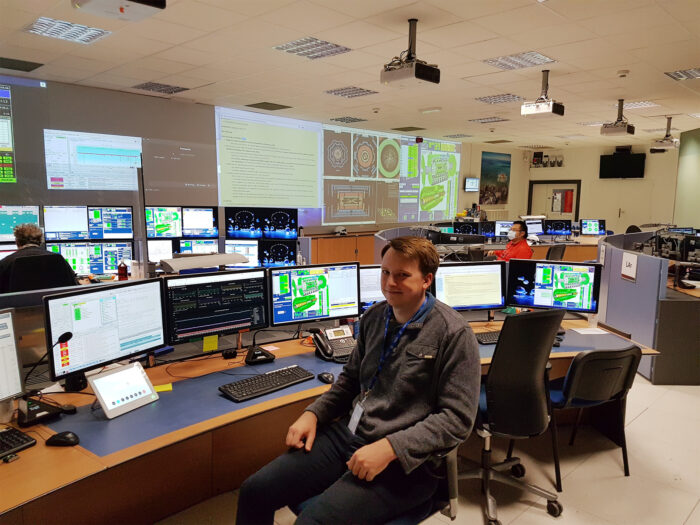Dr Bill Balunas, Trinity Hall Fellow in Physics, is a member of the international ATLAS Collaboration that has been awarded the Breakthrough Prize in Fundamental Physics for its pioneering studies of the high-energy collisions from the Large Hadron Collider (LHC). The prize, shared with the ALICE, CMS and LHCb Collaborations, recognises the extraordinary contributions of 13,508 international researchers who have pushed the boundaries of particle physics to unprecedented heights.
Fellow and international collaborators at CERN win Breakthrough Prize in Fundamental Physics
Posted:
22 Apr 2025
Dr Balunas has been a member of ATLAS since 2013, focusing his research on the Higgs boson – the fundamental force-carrying particle of the Higgs field which is responsible for granting other particles their mass. Dr Balunas explains:
“One of the topics I’ve been working on for the last few years has been the interaction of the Higgs boson with itself, which has deep connections with the origin of the masses of fundamental particles and with the formation of the Universe’s matter after the Big Bang. The only way to study this directly is to look at processes (proton collisions in the case of ATLAS) involving 2 Higgs bosons being created at the same time.”
More recently, Dr Balunas has developed a first-of-its-kind project looking at the interactions between three Higgs bosons:
“It’s the first time anyone has ever attempted this. We’re running experiments, analysing data and creating new software to detect tri-Higgs production – a process over 600,000 times rarer than the production of a single Higgs boson. Due to its extremely short lifetime, the Higgs boson cannot be directly detected so we look for its decay products.”

The LHC programme, of which ATLAS is a flagship piece, is arguably the most ambitious and largest-scale collaborative scientific effort in human history, trying to answer some of the deepest questions humanity can ask. How, at a basic level, does the Universe work? How did it come to be the way it is? What is dark matter? What else might be out there that we haven’t even thought of yet?
“We’ve made an enormous amount of progress on understanding these questions in the past 15 years, and it’s only been possible through close international collaboration – no one person or lab could ever have a hope of achieving this alone,” says Dr Balunas. “Particularly in a time of challenging international relations, this is a prime reminder of what we can accomplish when we all work together.”
The Breakthrough Prize in Fundamental Physics celebrates the collaborative effort to establish the Brout-Englert-Higgs mechanism of spontaneous electroweak symmetry breaking, test the Standard Model with remarkable precision, uncover rare and exotic particle interactions, and search for new physics phenomena that could reshape our understanding of the universe. Through the CERN & Society Foundation, the prize will fund PhD scholarships to support the next generation of ATLAS scientists as they build on this legacy of discovery.
“The Breakthrough Prize is a testament to the dedication and ingenuity of the ATLAS Collaboration and our colleagues across the LHC experiments,” says Stephane Willocq, ATLAS Spokesperson (University of Massachusetts Amherst). “In particular, Run 2 was a transformative period for particle physics. The results we achieved with its dataset have deepened our understanding of the Higgs boson, the Standard Model and the fundamental symmetries of Nature.”
About Dr Bill Balunas
Dr Bill Balunas is Walter Scott Fellow and College Assistant Professor in Physics, and Director of Studies in Natural Sciences (Physical, Physics and Astrophysics). His interests lie in fundamental particle physics, particularly on the experimental side. His work focuses on using the Higgs boson as a tool to probe unexplored areas, including searches for physics beyond the Standard Model. Specific topics have included invisible decays of the Higgs boson, other searches for dark matter, measuring the Higgs self-interaction, and Higgs boson pair production as a means to seek out undiscovered particles. On the technical side, his expertise includes event reconstruction and data analysis software, reconstruction of hadronic showers and invisible particles, and Monte Carlo modelling of particle interactions.
About ATLAS
ATLAS is a general-purpose particle physics experiment at the Large Hadron Collider (LHC) at CERN. It is designed to exploit the full discovery potential of the LHC, pushing the frontiers of scientific knowledge. ATLAS’ exploration uses precision measurement to push the frontiers of knowledge by seeking answers to fundamental questions such as: What are the basic building blocks of matter? What are the fundamental forces of nature? What is dark matter made of?
ATLAS is a collaboration of physicists, engineers, technicians, students and support staff from around the world. It is one of the largest collaborative efforts ever attempted in science, with over 5500 members and almost 3000 scientific authors. The success of ATLAS relies on the close collaboration of research teams located at CERN, and at member universities and laboratories worldwide.
